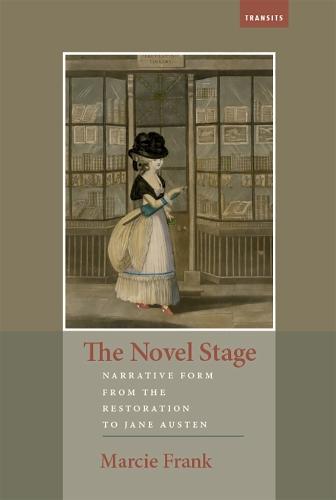Full Product Details
Author: Marcie Frank
Publisher: Rutgers University Press
Imprint: Rutgers University Press
Dimensions:
Width: 15.60cm
, Height: 1.80cm
, Length: 23.50cm
Weight: 0.004kg
ISBN: 9781684481675
ISBN 10: 1684481678
Pages: 230
Publication Date: 14 February 2020
Recommended Age: From 18 to 99 years
Audience:
College/higher education
,
College/higher education
,
Professional and scholarly
,
Tertiary & Higher Education
,
Tertiary & Higher Education
Format: Paperback
Publisher's Status: Active
Availability: In Print

This item will be ordered in for you from one of our suppliers. Upon receipt, we will promptly dispatch it out to you. For in store availability, please contact us.
Reviews
"“This interesting study explores the ways in which novels borrow from and develop theatrical conventions and forms during the eighteenth century. Examining a spectrum of practices, Frank explores the complex relationships between genre and form and offers new insights into the relationship between eighteenth-century theatre and literature.”— Helen Brooks, author of Actresses, Gender and the Eighteenth-Century Stage: Playing Women “The Novel Stage is an engaging and provocative text; its major insights about the key role of the repertory in eighteenth-century reading habits and the collaborations between theatre and fiction are bracing and of wide-ranging use.” — Manushug Powell, author of Performing Authorship in Eighteenth-Century English Periodicals ""Frank’s emphasis on generic and media fluidity and interrogation of fixed mindsets around them are, to use one of the words she unpacks in Burney’s novels, provocative; I can certainly see why The Novel Stage was named a 2020 Choice Outstanding Academic Title....Frank’s work is excellent at pointing towards new, interdisciplinary approaches to important discussions of genre and form.""— Tulsa Studies in Women’s Literature ""An important and long-overdue consideration of the relationship between the theater and the novel in the long 18th century, The Novel Stage treats major Restoration and 18th-century dramatic forms—tragicomedy, comedy of manners, and melodrama—as they abandon the stage to take up residence in prose fiction. Essential.""— Choice"
"""An important and long-overdue consideration of the relationship between the theater and the novel in the long 18th century, The Novel Stage treats major Restoration and 18th-century dramatic forms—tragicomedy, comedy of manners, and melodrama—as they abandon the stage to take up residence in prose fiction. Essential."" * Choice * ""Frank’s emphasis on generic and media fluidity and interrogation of fixed mindsets around them are, to use one of the words she unpacks in Burney’s novels, provocative; I can certainly see why The Novel Stage was named a 2020 Choice Outstanding Academic Title....Frank’s work is excellent at pointing towards new, interdisciplinary approaches to important discussions of genre and form."" * Tulsa Studies in Women’s Literature *"
An important and long-overdue consideration of the relationship between the theater and the novel in the long 18th century, The Novel Stage treats major Restoration and 18th-century dramatic forms--tragicomedy, comedy of manners, and melodrama--as they abandon the stage to take up residence in prose fiction. Essential. -- Choice
"""An important and long-overdue consideration of the relationship between the theater and the novel in the long 18th century, The Novel Stage treats major Restoration and 18th-century dramatic forms—tragicomedy, comedy of manners, and melodrama—as they abandon the stage to take up residence in prose fiction. Essential.""— Choice ""Frank’s emphasis on generic and media fluidity and interrogation of fixed mindsets around them are, to use one of the words she unpacks in Burney’s novels, provocative; I can certainly see why The Novel Stage was named a 2020 Choice Outstanding Academic Title....Frank’s work is excellent at pointing towards new, interdisciplinary approaches to important discussions of genre and form.""— Tulsa Studies in Women’s Literature"
Frank's emphasis on generic and media fluidity and interrogation of fixed mindsets around them are, to use one of the words she unpacks in Burney's novels, provocative; I can certainly see why The Novel Stage was named a 2020 Choice Outstanding Academic Title....Frank's work is excellent at pointing towards new, interdisciplinary approaches to important discussions of genre and form. -- Tulsa Studies in Women's Literature An important and long-overdue consideration of the relationship between the theater and the novel in the long 18th century, The Novel Stage treats major Restoration and 18th-century dramatic forms--tragicomedy, comedy of manners, and melodrama--as they abandon the stage to take up residence in prose fiction. Essential. -- Choice
Author Information
MARCIE FRANK is a professor of English at Concordia University in Montreal. She is the author of Gender, Theatre, and the Origins of Criticism from Dryden to Manley and How to be an Intellectual in the Age of TV: The Lessons of Gore Vidal, and co-editor with Jonathan Goldberg and Karen Newman of This Distracted Globe: Worldmaking in Early Modern Literature.




